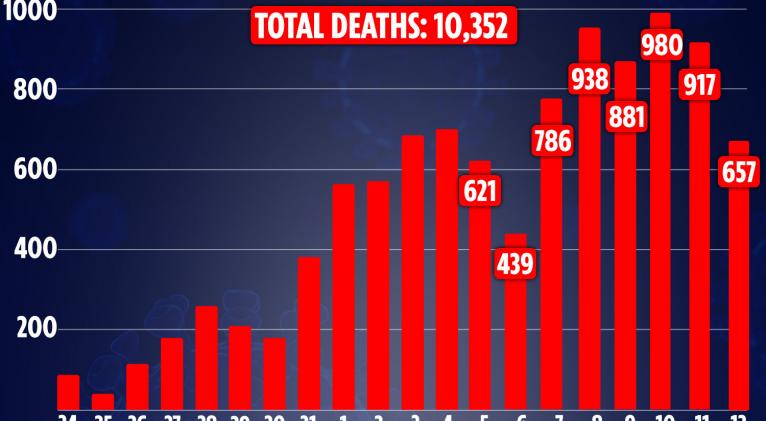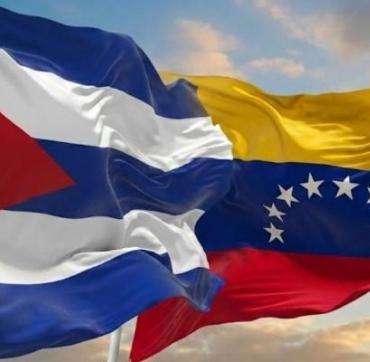10,000 UK coronavirus deaths: don't forget that this was preventable
especiales

Cast your mind back four weeks. Coronavirus deaths in the UK were in the tens, and the disease was ravaging Italy. The daily death tolls from Italy and then Spain were reported every 24 hours and the numbers were staggering, unfathomable and rising. Italy was “overwhelmed”, succumbing to a tragic scenario because of quarantine enforcement failures, and an inability to predict how quickly the disease would be transmitted. The highest daily death toll recorded in Italy was on 28 March, with 971 deaths. Spain’s highest came five days later with 950. On Friday, the death toll in UK hospitals was 980.
The UK is now surpassing the apocalyptic tolls we fixated on just two weeks ago. The same tragedies are unfolding across our country. Doctors and nurses are dying, exposed to heavy viral loads and often without adequate protective equipment. Covid-19 wards are saturated, echoing the calls of distress from Italian medical staff, as the specific shifts of doctors and nurses disappear and blend into one long coronavirus rota. But the sense of distress with which the Italian scenario was reported and received in the UK is strangely absent. Missing too is the urgent need to understand why this is happening.
Not only did the UK have the experience of Italy play out before the virus hit its own shores, illustrating clearly the measures that needed to be taken, it had explicit warnings from Italians spelling out the pitfalls to be avoided. Voices called out to the UK and foretold the mistakes that would cost lives. On 27 March, the Italian author Francesca Melandri wrote a letter to the UK from “our future”: “We watch you as you behave just as we did. You hold the same arguments we did until a short time ago, between those who still say, ‘It’s only a flu, why all the fuss?’ and those who have already understood.”
It is a jarring experience to wake up to a British death toll that is almost a thousand a day, and not see that number on every front page, being put to every politician in every single interview, with a demand for an explanation. It is as if those who should be asking these questions, from the media to opposition politicians, have been subjected to a mass memory-erasing exercise. Every report showing the scale of the crisis should be framed in the language of accountability and anchored in the premise of preventability. With all the benefits of hindsight, the government dragged its feet, wasted precious time and infused the issue with a sense of British exceptionalism: drastic measures need not be taken because in the UK things will somehow be different.
If there was any chance of that interrogation happening, it was made even less likely by Boris Johnson’s illness. The nation’s tragedy became secondary to his infection. It is understandable that the hospitalisation of a nation’s premier – a unique and destabilising event – should concern the media and government. But Johnson’s illness was folded into a larger, editorialised narrative about his martyrdom and indefatigability, turning his sickness and recovery into a virtue of character. And as that hagiography was being enthusiastically written in large parts of the press, the stories of the thousands of dead and grieving were buried under daily updates of the prime minister’s “high spirits” from his ICU bed. Questions over his responsibility for the national carnage – his complacent messaging over shaking hands with the afflicted, his delay in shutting down the country, his “herd immunity” policy, the ongoing lack of testing, of equipment and of ventilators – were not asked. The organisers of Cheltenham festival, which attracted more than 250,000 people from 10 to 13 March, justified going ahead by citing the presence of Johnson at an international rugby match a few days before.
The terminology of war did much of the work. The virus was framed in the context of an enemy to be fought in the trenches, rather than a series of public health policy failures. The death toll became not a daily count of individual devastation, but a cold sterile ticker of battle casualties. The Queen’s message, a call for noble resolve, further generalised the crisis into an act of God that we must weather by mobilising the powers of the British national character. It’s now a matter of grit, of reaching into our reserves to see us through until we meet again.
Despite the extent of the crisis, many doctors and nurses fear speaking on the record. Over the past few days I have received WhatsApp messages from NHS staff too afraid even to email them in case the paper trail leads to disciplinary action – detailing horrors of an NHS stretched thin, of ill-protected staff doing 36-hour shifts. They will be clapped every week, as the government claims to champion the NHS, yet gagged if they dare raise concerns. There is an effort to silence voices such as that of Abdul Mabud Chowdhury, a consultant who appealed publicly for protective equipment, only to perish from coronavirus days later. The official line last Tuesday was that we could be “moving in the right direction”. That day, the death toll almost doubled to 786.
The contrast between the numbers and the jadedness with which we meet them is down to some daily numbing effect, no doubt. This is made worse by the fact there are other exceptional circumstances to reckon with as we deal with self-isolation, loss of income and disruption to work and personal lives. And then there’s the time lag. It’s hard, as we lock down, to nurture an outrage that is based on decisions in the past when the loss of life is happening today – more so when the government has stealthily removed itself from the picture and shifted the responsibility entirely on to the public, responding to any concerns by robotically repeating the mantra: “Stay home, protect the NHS, save lives”. So, as lives are extinguished in their hundreds every day, we become busied with questions of policing, of social distancing, of shutting down parks, rather than on the government’s failed policymaking.
So, again, cast your mind back four weeks. Remember how it felt to see those numbers from Italy, how our hearts sank every time they went up by the hundreds, how we envisioned those numbers as terrorised citizens facing the end of their lives. Remember how we reeled at the thought that they all had families and friends whom they could not contact in their final moments, and who are now devastated by their loss. Relocate the pain and recall that this need not have happened. Ten thousand people, in UK hospitals alone, have now died.














Add new comment